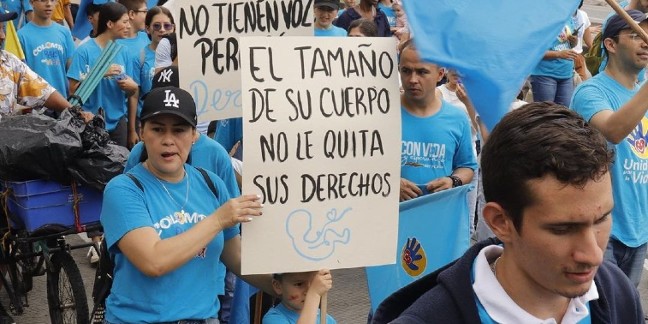 Pro-lifers march in the city of Cali, Colombia May 4, 2024, to show their support for unborn children. At least 300,000 Colombians marched in 114 cities. The signs held by protesters read: "The size of your body does not deprive you of your rights," and "I march for those that don't have a voice." (OSV News photo/courtesy Unidos por la Vida)BOGOTA, COLOMBIA — Pro-life activists marched in 114 cities on May 4 in Colombia to express to the authorities -- especially to the Constitutional Court -- their repudiation to abortion and euthanasia. The demonstrations were called by the "Unidos por la Vida" ("United for Life") platform, which congregates a number of pro-life movements.
Pro-lifers march in the city of Cali, Colombia May 4, 2024, to show their support for unborn children. At least 300,000 Colombians marched in 114 cities. The signs held by protesters read: "The size of your body does not deprive you of your rights," and "I march for those that don't have a voice." (OSV News photo/courtesy Unidos por la Vida)BOGOTA, COLOMBIA — Pro-life activists marched in 114 cities on May 4 in Colombia to express to the authorities -- especially to the Constitutional Court -- their repudiation to abortion and euthanasia. The demonstrations were called by the "Unidos por la Vida" ("United for Life") platform, which congregates a number of pro-life movements.
According to pro-life leaders, the conditions allowing abortion and euthanasia in the South American country have been gradually expanded over the past years by the Constitutional Court to the point that they're now legally performed, although there's no law allowing such practices.
Abortion was depenalized in Colombia in 2006 under three conditions: when the pregnancy puts the mother's health in danger, if the child is malformed and inviable, or if pregnancy is the result of rape or incest.
According to Luisa Barriga, national coordinator of 40 Days for Life Colombia, the idea of protecting the mother's health soon began to encompass women's mental health as well, something that enlarged the possibilities of abortion and led to a growing number of cases over the years.
"In 2018, the Constitutional Court began to call abortion a right, which is contrary to the constitution. Under the three conditions, children can be aborted till the ninth month of pregnancy," she told OSV News.
In 2022, the Constitutional Court allowed the decriminalization of abortion until the 24th week of pregnancy without conditions, Barriga said.
"There are no clear figures, but certainly dozens of thousands of abortions are carried out every year," Barriga lamented.
She said that doctors can refuse to perform abortions for moral or religious principles, but the institution must appoint another doctor to do it.
"In legal terms, it's very difficult to reverse the current situation," Barriga said.
Pro-abortion decisions keep being established by the Constitutional Court. On May 6, it ruled that a woman who wants to interrupt pregnancy must have access to a service that is free of acts of "obstetric violence" and "discrimination."
When it comes to euthanasia, the situation is quite similar, she argues. Euthanasia was depenalized in Colombia in 1997 and the Constitutional Court regulated it in 2015. No bill has ever been approved to allow it, but hundreds of people have undergone the proceedure since then.
In 2022, two citizens were allowed to submit themselves to euthanasia although they were not suffering from a terminal disease.
Despite so many adversities, Barriga affirmed that progress has been made lately. Thanks to the efforts of the pro-life movement, a pro-life bloc was recently formed in Congress.
Such lawmakers are currently working on bills to ensure that pregnant women are assisted by the state -- so they can go on with their pregnancies -- and to recognize the status of an unborn person.
"At least, now we have congressmen ready to debate such issues. It's a light of hope for us," Barriga said.
The pro-life movement has been growing, she confirmed. Forty Days for Life, which is an ecumenical initiative born in the United States, is now present in 64 Colombian cities, eight years after its foundation in Bogota. Along with other groups, it has been raising awareness among Catholics about pro-life issues.
This year, the bishops' conference's Promotion and Defense of Life department invited Catholics to take part in the marches, and many cities joined the protest, with over 300,000 people marching in over 100 cities. The largest demonstrations took place in Cali, Medellín and Barranquilla.
The marches occurred amid a politically charged atmosphere in Colombia. Over the past days, anti and pro-government protests gathered thousands of people in a number of cities. The demonstrations began after President Gustavo Petro announced his will to advance a number of reforms in the country in order to expand the state's presence in the health-care system and combat social inequalities.
Barriga said that the pro-life marches were not political, despite the fact that they were supported by politicians in a few locations. She stressed, however, that the current administration's "orientation is contrary to life and such a political landscape impacts the pro-life movement."
"But our idea was not to be interpreted as a political march. We wanted to send a pro-life message to all authorities," she concluded.
— Eduardo Campos Lima, OSV News


